Cornerstone Biblical Commentary Upgrade (CBC) (7 vols.)
Digital Logos Edition
Overview
The Cornerstone Biblical Commentary series provides students, pastors, and laypeople with up-to-date, accessible evangelical scholarship on the Old and New Testaments. Presenting the message for each passage, as well as an overview of other issues relevant to the text, each volume equips pastors and Christian leaders with exegetical and theological knowledge so they can better understand and apply God's Word.
In the Cornerstone Biblical Commentary Upgrade, such topics as worship, theology, the reign of Saul, the history of Chronicles and why it is important to us today as well as many other topics are covered. In each resource, the reader is brought through the text each passage at a time with an in depth commentary for each verse.
Check out the first 9 volumes of the Cornerstone Biblical Commentary Series!
- Introductions to the historical and cultural context, the literary style, and the major themes and theological concerns
- Exegetical and textual notes
- Commentary pays special attention to context and major theological themes
An enormously helpful series for the layperson and pastor alike because it centers on the theological message of each book and ties it directly to the text. This approach has been needed for some time and will be an invaluable supplement to other commentary series.
—Grant Osborne
A treasure house of insight into the biblical text. Written by some of the best scholars working today, it is an essential tool for pastors, students, church leadesr, and lay people who want to understand the text and how how it relates to our lives today. Like the NLT text it uses as its base, this commentary series is extemely readable.
—Tremper Longman III
- Title: Cornerstone Biblical Commentary Upgrade
- Publisher: Tyndale House Publishers
- Volumes: 7
- Pages: 3,592
This title is included in the following collections
You can save when you purchase this product as part of a collection.
Logos 8 Bronze Legacy Library
$89.99$89.99Logos 8 Anglican Bronze Legacy...
$89.99$89.99Logos 7 Pentecostal & Charisma...
$89.99$89.99Logos 9 Pentecostal & Charisma...
$89.99$89.99
- $349.99
- $349.99
- $349.99
- $349.99
- $349.99
- $489.80$390.99
- $849.99
- $849.99
- $849.99
- $849.99
- $849.99
- $849.99
- $849.99
- $849.99
- $991.99
- $1,168.99
- $1,499.99
- $1,499.99
- $1,499.99
- $1,499.99
- $1,499.99
- $1,499.99
- $1,499.99
- $1,499.99
- $1,499.99
- $1,499.99
- $2,999.99
- $2,999.99
- $2,999.99
- $2,999.99
- $2,999.99
- $2,999.99
- $2,999.99
- $2,999.99
- $2,999.99
- $2,999.99
- $2,999.99
- $4,749.99$3,562.49
- $4,749.99$3,562.49
- $4,749.99
- $4,749.99
- $4,749.99
- $4,749.99
- $4,749.99
- $4,749.99
- $4,749.99
- $4,749.99
- $4,749.99
- $4,749.99
- $11,399.99
- $11,399.99
- $11,399.99
- $23,999.99$17,999.99
- $21,749.99
- $24,999.99
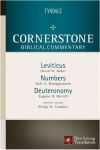
Studying the book of Leviticus is not something that many people do, but Baker, Brueggemann and Merrill mention that it is a necessary book to read for three reasons: theological, religious and historical. The theological aspect of Leviticus is important because it gives a history of the people of Israel and many of the concepts and terms that were common to Jesus were first mentioned in Leviticus. For example, in John 1:29 where it says Jesus is the “Lamb of God who takes away the sin of the world” would be unfathomable if Leviticus 4:32–35 was not kept in mind. Additionally, the story of the woman who was hemorrhaging in Mark 5:25–34 would not be as easily comprehended if we did not have Leviticus 15:25–27 as background.
The second reason to study Leviticus is that of religious reasons. In today’s church, the who, where, when, why and how of worship and whether or not it can be accomplished in a group and the possibility of it being something that can between a person and God, something that can achieved one on one is discussed. Cornerstone Biblical Commentary: Leviticus, Numbers, Deuteronomy gives the reader a greater understanding of worship and the importance it has in our lives.
Thirdly, Leviticus is discussed from a historical perspective. The information came from those who were part of history and the book gives background to how they had an impact on the ancient Near East.
The content covered in Numbers by Dale Brueggemann breathes new life into the book and gives us a new understanding of the content in Numbers. Eugene H. Merrill gives an in depth look to Deuteronomy and how it is pertinent to us today.
David Baker, Ph.D. is professor of Old Testament and Semitic languages at Ashland Theological Seminary in Ohio. He serves as editor for the Evangelical Theological Society's Dissertation series and Studies series. He has authored several articles/books, including the NIV Application Commentary on Joel, Obadiah, and Malachi and The Face of Old Testament Studies: A Survey of Contemporary Approaches. Dr. Baker served as a Leviticus reviewer for the New Living Translation.
Dale Brueggemann pastored in Idaho throughout the 1970s. He has taught at Valley Forge Christian College in Philadelphia, and at Central Bible College in Missouri.
Eugene H. Merrill is Distinguished Professor of Old Testament Studies at Dallas Theological Seminary in Texas and Distinguished Professor of Old Testament Interpretation at The Southern Baptist Theological Seminary in Kentucky. He is currently director of Eurasia education services for Assemblies of God World Missions, and he has been heavily involved in ministry in Europe, Asia, and the Middle East. He is the author of several articles/books, including a commentary on Deuteronomy in the New American Commentary series and the Deuteronomy study notes for the NLT Study Bible. He also served as a Deuteronomy reviewer for the New Living Translation.
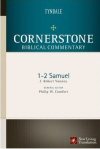
1 & 2 Samuel
- Author: J. Robert Vannoy
- Publisher: Tyndale House Publishers
- Publication Date: 2009
- Pages: 464
In Cornerstone Biblical Commentary: 1 & 2 Samuel, J. Robert Vannoy covers such topics as the reign of Saul, how his reign corresponds with David, Samuel and Israel. Also discussed are the famous stories of David and Goliath as well as that of David and Jonathan.
J. Robert Vannoy, Th.D. is Professor Emeritus and Allan A. MacRae Chair of Biblical Studies at Biblical Theological Seminary. He has over 40 years of experience in teaching and has served as a translation consultant for the NIV, TNIV, and NLT. He has also contributed articles to various publications including reference works (such as the Baker Encyclopedia of the Bible and the Evangelical Dictionary of Biblical Theology), scholarly journals, and magazines. He and his wife are blessed with four children and over 10 grandchildren. Outside of Old Testament studies, Robert enjoys family, gardening, photography, hiking, and exploring islands on the Maine coast.
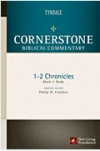
Mark J. Boda makes reference to the point that from a literary and historical standpoint, the books of Chronicles have been ignored and even criticized in Biblical studies. Boda argues that even though Chronicles covers the “whole of sacred history,” the greatest part of its history is included in 1 Chronicles 1–9, although those chapters are filled with genealogical lists where 1 Chronicles 10 through 2 Chronicles 9 deals with David and Solomon’s narratives.
Another reason that Chronicles has not been paid much attention is the incorrect thought that it does not have historical merit. When studying 1 & 2 Chronicles, the Cornerstone Biblical Commentary is beneficial for those wanting to learn more about the history of the book.
Mark J. Boda has authored numerous articles and books in addition to editing several collections of scholarly essays on various topics related to the Old Testament and Christian Theology. He taught for nine years at Canadian Theological Seminary before joining McMaster Divinity College in 2003. Mark enjoys mentoring students and teaches with enthusiasm about the Old Testament and its continued relevance to the Christian life today.
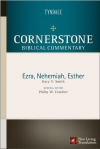
Ezra, Nehemiah, Esther
- Author: Gary V. Smith
- Publisher: Tyndale House Publishers
- Publication Date: 2010
- Pages: 400
Ezra deals with the sacrifice that we all have to make at one point in our lives and how to deal with the choices that must be made when faced with sacrifice.
When reading the book of Nehemiah, the reader sees three ideas emerging. First, when reading the word of God, we must pay careful attention to what is being said, so that the content is not misunderstood. Second, there is a recurring theme of enemy opposition and thirdly, through everything that Nehemiah went through, he was still obedient.
In the book of Esther, such topics as death, danger, social rejection as well as many others are covered and referencing the in Cornerstone Biblical Commentary: Ezra, Nehemiah, Esther helps you deal with these when faced with them in our lives.
Gary V. Smith, Ph.D. was a member of the translation teams for both the NLT and HCSB Bible translation projects and has written numerous articles, reviews, and books on the Old Testament. These include Hosea, Amos, and Micah for the NIV Application Commentary series and Isaiah in the New American Commentary series. He has taught Old Testament at Bethel Theological Seminary in Minnesota and was professor of Old Testament and Hebrew at Midwestern Baptist Theological Seminary in Missouri. In 2004 he began teaching at Union University, where he is currently professor of Christian Studies.
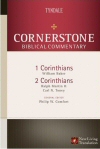
In the time of Paul, Corinth was a very diverse place. There were a large amount of people drawn to Corinth with the hope of creating better lives for themselves. The Corinthian marketplace was constantly growing because of the people who were migrating to the city. This influx of people caused the town to grow to 100,000 inhabitants in less than 100 years. When Paul wrote Corinthians, the church was a gathering of only a few believers and was only a few years old. By keeping this in mind, we can relate the information written by Paul for when issues arrive in today’s church as what was written then is still pertinent to us today.
William R. Baker, Ph. D. is professor of New Testament at Cincinnati Bible Seminary in Cincinnati, Ohio. He is the general editor of Stone-Campbell Journal and the author and editor of several books and articles, including Evangelicalism and the Stone-Campbell Movement and Sticks and Stones: The Biblical Ethics of Talk. He has also written a commentary on 2 Corinthians for the College Press NIV Commentary Series.
Ralph P. Martin, Ph. D. is is in his fifth decade as a teacher, scholar, and mentor. He is Distinguished Scholar in Residence at Fuller Theological Seminary, at the Graduate School of Theology of Azusa Pacific University, and at Logos Evangelical Seminary in Pasadena, California. He is the author of numerous studies and commentaries on the New Testament, including Worship in the Early Church, Philippians in The Tyndale New Testament Commentary series, and James in the Word Biblical Commentary for which he also serves as New Testament editor. He also co-edited the Dictionary of Paul and His Letters and the Dictionary of the Later New Testament and Its Developments. Ordained to the Baptist ministry in 1949, Dr. Martin has pastored churches in Dunstable, Southport, and Gloucester, England.
Carl N. Toney, Ph. D. is adjunct assistant professor of New Testament at Fuller Theological Seminary in Pasadena, California. He edited and contributed to the revised edition of 2 Corinthians in the Word Biblical Commentary series and is the author of Paul's Inclusive Ethic: Resolving Community Conflicts and Promoting Mission in Romans 14-15. A licensed minister in the American Baptist Convention, Dr. Toney is also a member of the Society of Biblical Literature.
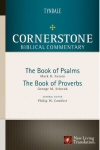
Psalms has often been thought of as a book of praise, but it also contains mourning, bewilderment, and confusion. In fact, the amount of “negative psalms” outnumbers the psalms of praise. Futato shows us the difference between the negative aspects and the psalms of praise and that praise is part of the concluding phrase in the book. Not only that, but praise is large part of the negative psalms.
To think of oneself as a fool is not something that most people want to do and reading Schwab’s book on Proverbs gives the reader a greater understanding of its content. Schwab makes the point that no fool would seek out God’s wisdom, and by persisting in the reading of Proverbs, we are reminded that even though we can behave unwise in certain points in our lives, by keeping the thoughts and ideas in Proverbs in the forefront of our minds that we can grow in wisdom and knowledge.
Mark D. Futato, Ph.D. is Robert L. Maclellan Professor of Old Testament and academic dean at Reformed Theological Seminary in Florida. He is the author of several books and articles, including Beginning Biblical Hebrew and Interpreting the Psalms: An Exegetical Handbook. He has also contributed to The Spirit of the Reformation Study Bible and The New International Dictionary of Old Testament Theology and Exegesis. Dr. Futato is an ordained minister and served on the translation team for the book of Psalms in the New Living Translation.
George M. Schwabb, Sr., Ph.D. is associate professor of Old Testament at Erskine Theological Seminary in South Carolina. He is ordained in the Second Presbytery of the Associate Reformed Presbyterian Church and is a member of the Society of Biblical Literature and the Evangelical Theological Society. He has authored numerous scholarly publications, including Hope in the Midst of a Hostile World: The Gospel According to Daniel. He served as a reviewer for Psalms and the wisdom books for the New Century Version.
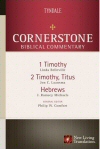
The books of First Timothy, Second Timothy and Titus are frequently referred to as the Pastoral Epistles. The reason for this title is that the letters that Paul wrote in these 3 books were written to Timothy and Titus, two of his previous colleagues and apprentices as they had questions about many issues that they were facing and how to deal with them.
The issues facing Timothy and Titus are not that different than the ones that today’s pastor faces in the course of their ministry. Such issues they faced were how to train church leaders, being good stewards of material resources, how men and women are to interact with one another in the church, how to exercise discipline within the church, creating a support system for widows, how to counteract false teaching and the way in which the believer is supposed to act in regards to society and government.
Linda L. Belleville, Ph.D. is Professor of Greek and New Testament at Bethel College in Mishawaka Indiana. She has published commentaries on 1 and 2 Corinthians and various articles and essays on 1 Timothy. She has been a member of the translation team for the New Living Translation since its inception.
Jon Laansma, Ph.D. is Associate Professor of Ancient Languages and New Testament at Wheaton College in Wheaton, Illinois. He is the author of several articles and of "I Will Give You Rest": The "Rest" Motif in the New Testament with Special Reference to Matthew 11 and Hebrews 3–4. He contributed the introductions and notes for 1 & 2 Timothy and Titus for the NLT Study Bible.
J. Ramsey Michaels, Th.D. is Professor of Religious Studies Emeritus at Missouri State University in Springfield, Missouri. He has published commentaries on the Gospel of John, 1 Peter, and the book of Revelation. He has been a member of the translation teams for the New International Version and the New Living Translation and has been a consultant for the American Bible Society.
Reviews
3 ratings

Tyrone K Toler
5/24/2014
sungkook hwang
10/16/2013

Antowine Jordan
9/26/2013